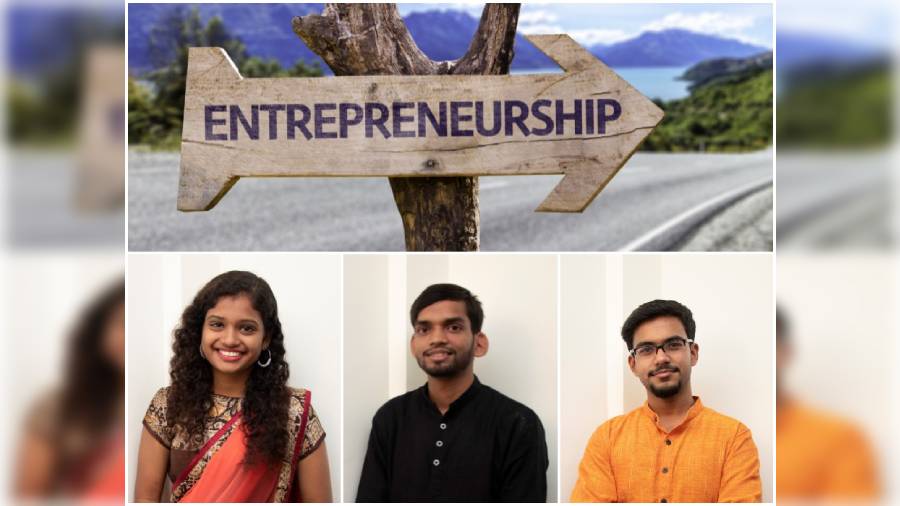Every year, over 80 lakh students pass out of undergraduate and graduate courses in India. These include conventional three-year degree courses and four or five-year professional courses such as engineering, medicine, law and business management. In a country whose current unemployment rate is 7.6 per cent (according to the Centre for Monitoring Indian Economy), very few of the fresh graduates are expected to get regular jobs. And yet millions join graduation courses with a dream to crack a steady job.
There’s a very small number that treads an offbeat track to become an entrepreneur. So what does it take to be an entrepreneur?
Aaquib Hussain has mentored several start-ups through Freeflow, an incubator and accelerator he co-founded for new ventures by fresh graduates. When a student comes up with a brilliant idea, he helps him or her build a team with like-minded others, organises seed investment for a start-up and guides them to create a new venture. He says, “First, identify people’s problems and then ask the right questions to fix the problems. If you can solve the problem with a long-term solution for those people — your prospective customers — you know you have a killer idea for a successful venture.”
Take the case of Ranjan Kumar Gupta, a fresh BTech graduate in civil engineering from Heritage Institute of Technology (HIT), Calcutta. Currently an MTech student at the Government College of Engineering and Ceramic Technology, also in Calcutta, he teamed up with two fresh graduates of electric engineering at HIT, Anushka Nayak and Upamanyu Chatterjee, to co-found RAU Industries. The start-up has invented a new technology to convert plastic waste into construction materials, such as bricks, kerb stones and paver blocks. Their new venture is a result of their problem-solving skills on how to handle unsegregated plastic waste.
Says Gupta, “We realised waste plastic is a very big problem and we can solve this by creating something useful and sustainable.” The start-up recycles tonnes of plastic waste to create construction materials in five manufacturing units in Bengal and Bihar that employ over 60 people. They have applied for three patents for their unique products and authored 12 research papers in international technology journals based on their experience.
Gupta mentions a tough beginning that all entrepreneurs face. “Initially, we faced disbelief from engineers, refusal from investors and doubts from our own family members.” But they overcome these hurdles, focusing on the goal and with a strong passion for innovation. He acknowledges the mentorship of Freeflow for being their “strategic mentor” from day one. He adds, “They helped us a lot, from finding prospective investors to helping us validate the value of products in the market.”
Madhukar Shukla, professor of organisational behaviour and strategic management at XLRI-Xavier School of Management, Jamshedpur, too has mentored a number of entrepreneurs among fresh graduates in the institute. However, he focuses on social entrepreneurship in which an individual or a team develops, funds and implements solutions to social, cultural and environmental issues.
According to him, to become a social entrepreneur one must be connected to people and their problems. One needs to go to the field, talk to people, make a list of their unaddressed problems and then look for solutions. He says, “In social entrepreneurship, profit making is not the primary motto. The target should be solving social problems.”
However, getting funding for social entrepreneurship is a big challenge. Generally, students organise initial funding for their start-ups from friends, family and acquaintances. There are some who invest in ideas that try to solve social problems. Shukla says if social entrepreneurs choose product-oriented social services like building a solar power system or deals in solar lanterns, they can expect financial returns quickly. Social entrepreneurship in the field of education technology, or agricultural technology also succeeds.
Biswajit Bordoloi, an alumnus of XLRI, who studied entrepreneurship management, founded Mahabahu Agritech, a start-up at Margherita, Assam. It offers technology solutions to small and marginal farmers, especially women. Bordoloi, who has an undergraduate degree in mechanical engineering and wide experience in the field of agriculture and rural development, chose this offbeat path three years ago. He says, “We help farmers apply the latest technology and knowhow in their field.” For instance, he trains them in hydroponics or growing crops directly in nutrient-rich water. “In this method, you skip the soil as plants grow with roots in water or very moist air,” he explains. Since the plants grow without any soil, they don’t need a lot of fertiliser or chemical pesticides. “We also train farmers in organic farming, pisciculture and raise goateries,” he says.
As Hussain says, it’s a long and winding way for entrepreneurs, but the rewards give you a lot of satisfaction in the end.










